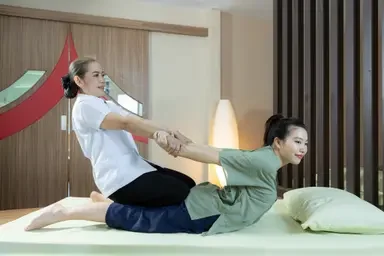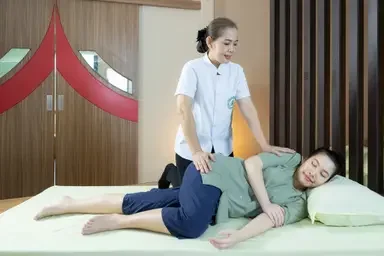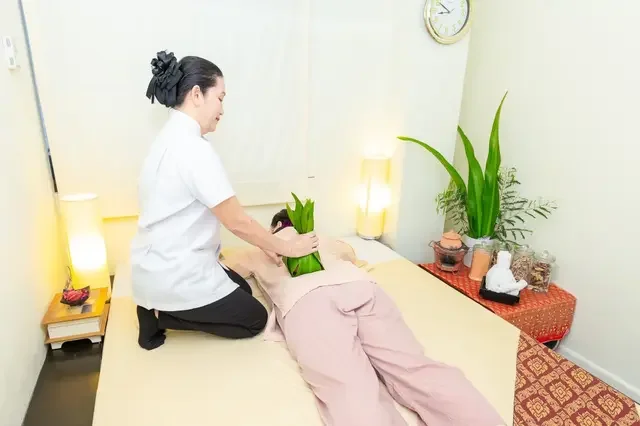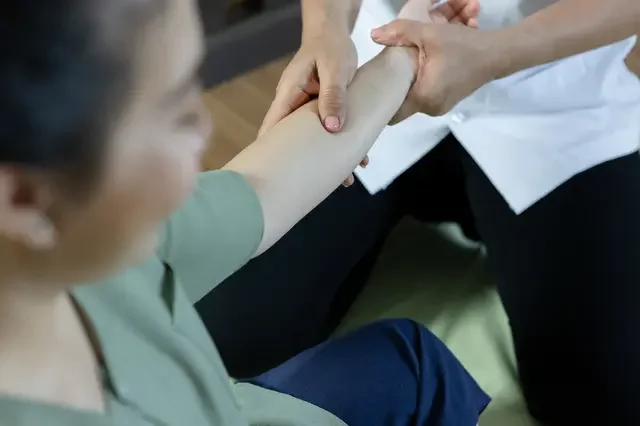How to Choose the Right Thai Massage School in Thailand (September 2025 Guide)
Hey, everyone! Monchai back with you again. As my friend Madison works on expanding her massage therapy expertise, I thought I'd create this blog that could benefit both her journey and hopefully yours as well.
Picture yourself mastering the ancient art of Thai massage in its birthplace — my birthplace as well — then returning home with skills that could transform your career, or at least impress your friends. Every year, thousands of people make this dream a reality, but not all training experiences are a fit for you.
With dozens of schools, competing styles scattered across Thailand, choosing the right Thai massage training program can feel overwhelming. In this guide, I'll walk you through everything you need to know before signing up, from official recognition and course styles to costs, accommodations, and whether your certificate will be valid back home.
A Thai massage technique. PHOTO: https://watpomassage.com/en
1. What Do You Want From Your Thai Massage Training?
Not all students come to Thailand with the same goals in mind. Being crystal clear on your intentions will help you filter schools immediately. Which category best describes you?
Casual Learner – Want a short introduction course (3–5 days) to take home some authentic skills
Wellness Professional – Already a massage therapist, yoga instructor, or spa worker looking to add traditional Thai massage techniques to your toolkit
Career Changer – Planning to build a long-term practice and possibly work internationally with proper certification
👉 Your goals determine everything from course length to budget, so nail this down first.
2. Verify Ministry of Public Health Recognition
Here's where many students make their biggest mistake: choosing a school without proper credentials.
In Thailand, the Department of Health Service Support (HSS) under the Ministry of Public Health oversees legitimate massage schools. Choosing an HSS-recognized school means:
The curriculum meets Thai health and safety standards
You'll receive an official certificate upon completion
It's much easier to prove legitimacy when presenting your training abroad
You're learning authentic Nuad Thai (traditional Thai massage), not a watered-down version
💡 Well-established schools like Wat Po Thai Traditional Medical and Massage School in Bangkok and ITM (International Training Massage) in Chiang Mai have official recognition. Always ask the school to confirm their HSS status before enrolling—legitimate schools are proud to show this credential.
3. Choose Your Training Location Wisely
Where you study dramatically impacts your overall experience, costs, and learning environment:
Bangkok: Urban Convenience
Home to Wat Po (the original Thai massage temple), with easy international access and city amenities. Perfect if you want to combine training with urban exploration, but expect higher costs and more distractions.
Chiang Mai: Thailand's Massage Capital
Dozens of schools, lower living costs, and a slower pace ideal for focused learning. The mountain setting and expat community create an immersive environment that many students prefer.
Rural & Retreat Centers
Some schools offer training with meditation, yoga, or retreat elements in lush forest areas. Choose this if you want complete immersion away from modern distractions.
PHOTO: https://watpomassage.com/en
4. Match Course Length to Your Goals
Thai massage training programs vary dramatically in depth and time commitment:
Course Type: Introductory
Duration: 3-5 days
Cost Range: $200-400
Best For: Travelers, personal use
Course Type: Foundation
Duration: 1-4 weeks
Cost Range: $1,000-1,600
Best For: Adding skills to existing practice
Course Type: Professional Diploma
Duration: 2-6 months
Cost Range: $2,500-5,000
Best For: Career change, therapeutic work
Specialized Add-Ons many schools offer:
Oil Massage & Aroma Therapy – Common offering for overall holistic health
Herbal Compress Therapy – Hot herbal steam treatments
Infant and Child Massage – Offered at Wat Po Massage School and maybe others
5. Budget for the Full Experience
Here's what to realistically expect in 2025, including often-forgotten costs:
Training Fees:
Short courses: $200–$400
4-week foundation programs: $1,000–$1,600
Professional diplomas (2–6 months): $2,500–$5,000
Living Expenses:
Budget accommodations: $20-35/night
Mid-range guesthouses: $35-70/night
Meals: $6-18/day
Visa fees if applicable
Other expenses like health insurance, transportation, and leisure activities
💡 Schools like ITM Chiang Mai and Sunshine Massage School offer student arrangement assistance for nearby accommodations. Always clarify whether lodging, meals, or materials are included in your course fee upfront.
Once you know your budget parameters, you can focus on the learning environment that matters most.
6. Consider Language and Teaching Styles
Most major schools now teach in English, but the approach varies significantly:
Traditional Style (Wat Po) – Structured, temple-based learning with formal sequences and deep cultural context
Modern Approach (Chiang Mai schools) – Casual atmosphere, caters to curious students sampling the discipline, as well as serious practitioners
Retreat-Style Centers – Combine massage training with meditation, yoga, or intentional community living
👉 If English isn't your strongest language, ask whether the school provides bilingual materials in other languages or visual learning aids. The hands-on nature of Thai massage helps, but theory sections can be challenging to non-English or non-Thai speakers.
PHOTO: https://watpomassage.com/en
7. Research Schools Thoroughly
Don't rely solely on one website (including this one) or social media posts. Here's how to dig deeper:
Check Multiple Review Sources:
Google Maps & Reviews, and Facebook reviews
Reddit forums (r/Thailand, r/MassageTherapists)
Thailand travel forums
Request Detailed Information:
Complete syllabus with hours breakdown
Student-to-teacher ratios
Amount of hands-on practice time
Continued education support
8. Will Your Certificate Work Back Home?
This is the question I hear most often, and the answer is nuanced:
The Reality Check: A certificate from Thailand proves authentic training and is highly respected in the wellness industry worldwide. However, legal acceptance depends entirely on your home country's regulations.
What This Means:
United States: You'll typically need to combine Thai training with local licensing requirements through your state's massage therapy board (coordinated by the Federation of State Massage Therapy Boards - FSMTB)
Canada: Requirements vary by province - contact provincial regulatory bodies like the College of Massage Therapists of Ontario (CMTO) or similar organizations in your province
Europe: Regulations vary significantly by country - the UK has no formal national regulation, while countries like Germany have specific requirements through their health ministries
Australia: Contact the Australian Association of Massage Therapists (AAMT) or your state's health professional council for specific requirements
Spa and Wellness Industry: Thai certificates provide a competitive edge and are widely recognized globally
Key Licensing Bodies to Contact:
USA: Federation of State Massage Therapy Boards (fsmtb.org) + your individual state board
Canada: Provincial colleges (e.g., CMTO for Ontario, CMTBC for British Columbia)
Australia: Australian Health Practitioner Regulation Agency (AHPRA) or AAMT
Europe: Contact individual country health ministries (no unified EU regulation)
9. Essential Questions Before You Enroll
Get the information you need by asking these specific questions:
Is your school officially recognized by Thailand's Ministry of Public Health?
What's the maximum class size? (Ideal: 8-12 students, but of course, it’s up to you)
How many hours of hands-on practice will I get with real partners?
Do you provide or arrange accommodations nearby?
What language is instruction in, and do you provide translated materials?
Can I continue with advanced training later if I want to deepen my skills?
Do you offer business guidance for graduates? (Note: Non-Thais are prohibited from working as a Thai Massage therapist inside Thailand.)
10. Pro Tips for Success
When choosing your ideal school, consider what makes the biggest difference for you:
Don't Choose by Price Alone – The cheapest option sometimes skimps on practice time, which is where real learning happens
Book Early During Peak Season – December–February and June–August fill up fast
Pack Smart – Comfortable, loose clothing you can move in, a notebook for theory, and an open mind
Embrace the Cultural Element – Thai massage isn't just physical technique; it's rooted in mindfulness, energy work, and Buddhist compassion principles
Ready to start comparing schools? The next step is researching specific institutions that match your goals and budget.
PHOTO: https://watpomassage.com/en
FAQ: Thai Massage School Selection
Q: Do I need prior massage experience?
A: No, most schools welcome complete beginners. However, having basic body awareness from yoga, dance, or sports can be helpful.
Q: How many training hours do I need to work professionally?
A: Licensed massage therapists typically need 500-1,000 hours minimum (varies by location), but for wellness/spa work, 150–300 hours of quality training plus ongoing practice is often sufficient.
Q: Can I combine study with travel around Thailand?
A: Absolutely—many travelers take short courses while exploring. Chiang Mai is especially popular for this approach.
Q: Is online Thai massage training legitimate?
A: Online theory courses exist and can supplement learning, but hands-on training in Thailand is considered the gold standard for authentic technique.
👉 Ready to dive deeper?
Check out my school-by-school comparison: [Best Thai Massage Schools in Thailand for Foreigners (2025 Guide)]
I wish you the best during your search for the right Thai Massage School in Thailand. Cheers! — Monchai
MORE RESOURCES:
Tomorrowland Thailand 2026: Your Complete Travel Guide for the Festival of a Lifetime
🎵 Best Live Soul & R&B Venues for Mature Travelers and Expats in Bangkok (2026)
How Expats & Long-Term Visitors Get a Thai Driver's License (Cars & Motorcycles) — 2025 Complete Guide
Best Time to Visit Thailand?: What I Tell My Friends
Bangkok's Hidden Fitness Gem: Your Complete Guide to Cardio Around Chulalongkorn University & National Stadium
Complete Guide to Working in Thailand as a Foreigner (2025): Visas, Work Permits & Legal Requirements
Best Mindfulness Retreats in Thailand for English Speakers Guide, click HERE.
Looking for Bangkok’s best second-hand markets? Check it out HERE.
For Do’s and Don’ts while visiting Thailand, click HERE.
Read about Thailand medical tourism’s Top Hospitals, Costs and Procedures.
Bangkok Art and Culture Centre (BACC): Your Free Cultural Escape in Siam Area - Complete Visitor Guide
Bangkok’s #1 transportation choice for tourists: BTS Sukhumvit Line (2025 Guide)
Was this content useful? For the latest Thailand living tips, travel hacks, and perhaps retirement blog updates, pop in your email the box below. Let’s explore Thailand together!
And, if you’re ready to explore Thailand for the first time and need my help with your trip itinerary, hit me up HERE. I’m an Independent Travel Advisor of Fora Travel.
Cheers! - Monchai



